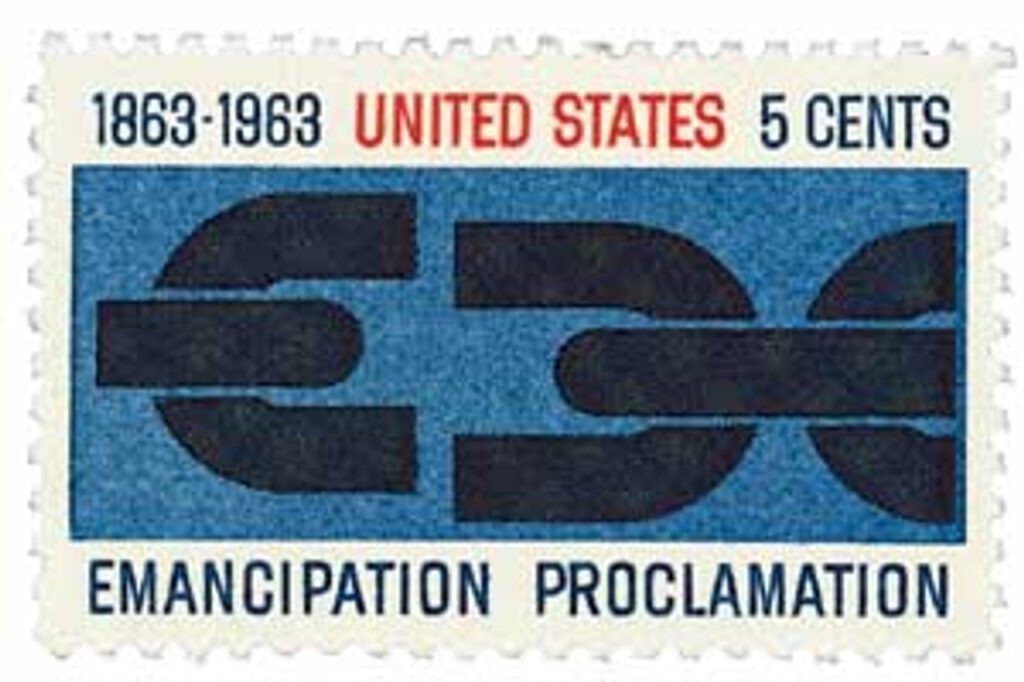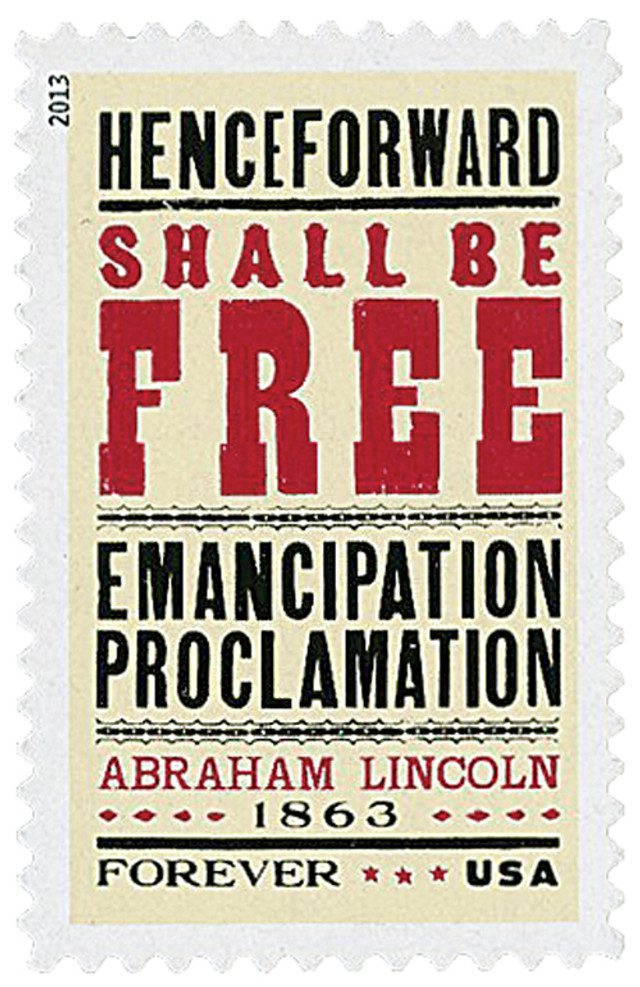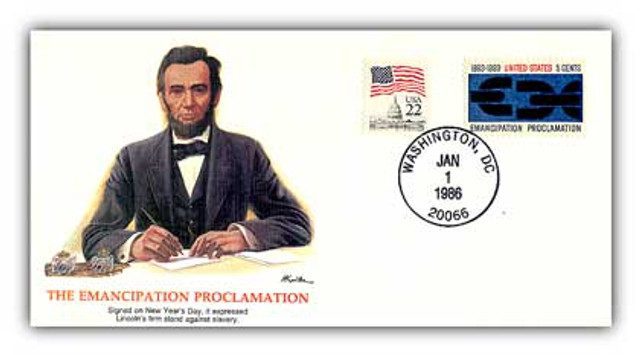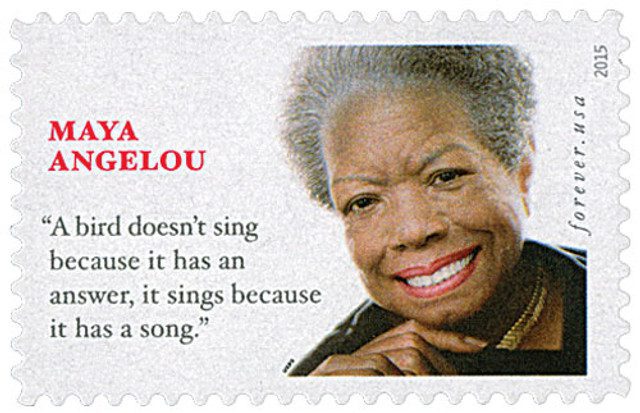On June 19, 1865, slaves in Galveston, Texas, were finally informed of their freedom by the Emancipation Proclamation (issued two years prior). The day the last American slaves were freed has become a federal holiday observed across the country.
In the summer of 1862, the Confederates scored one victory after another. President Lincoln believed freeing slaves would weaken the South by greatly reducing its labor force. He prepared a proclamation that would free slaves in the Rebel states, but needed a Union victory to win support in the North. That chance came in September, when Northern forces stopped a Confederate invasion at Antietam, Maryland.
Within weeks, Commander-in-Chief Lincoln gave the Rebel states an ultimatum: rejoin the Union before the new year or their slaves “henceforward shall be free.” The focus of the Civil War changed from restoring the Union to ending slavery.
On the first day of 1863, Lincoln issued his Emancipation Proclamation. The order only applied to people enslaved in Confederate states, but thousands of Black refugees, or “contrabands of war,” at Union-held forts in the South celebrated their liberty. Young Black men tasting freedom for the first time joined the US Army and Navy in its fight to restore the Union and grant liberty to those still in bondage.
However, Lincoln’s proclamation had no effect on the daily life of many of those enslaved. This was particularly true of isolated areas like Galveston, Texas. Over the course of the war, planters and slaveholders moved to Texas to avoid the fighting. The number of enslaved people in Texas increased dramatically – from about 1,000 in Galveston and Houston in 1860 to over 250,000 in all of Texas by 1865.
Far away from the battlegrounds and major eastern cities, news was slow to reach Galveston. It’s unclear exactly why the people enslaved in Galveston didn’t hear of their emancipation for over two years. It’s been suggested that a messenger was sent but was killed along the way. Another possibility is that those who owned Black people simply didn’t tell them so they could continue the practice. Some have even suggested that federal troops intentionally waited to allow additional cotton harvests.
Even though the war ended in early April, the people of Texas didn’t find out about it until May. Then the following month, on June 18, 1865, Union General Gordon Granger arrived in Galveston to occupy the state on behalf of the federal government. The next day, June 19, 1865, Grander stood on the balcony of the Ashton Villa (one of the first brick buildings in Texas) and announced the emancipation of the slaves:
“The people of Texas are informed that, in accordance with a proclamation from the Executive of the United States, all slaves are free. This involves an absolute equality of personal rights and rights of property between former masters and slaves, and the connection heretofore existing between them becomes that between employer and hired labor. The freedmen are advised to remain quietly at their present homes and work for wages. They are informed that they will not be allowed to collect at military posts and that they will not be supported in idleness either there or elsewhere.”

The now formerly enslaved men, women, and children took to the streets to celebrate their newfound freedom. The following year the freedmen of Texas held their first organized Juneteenth celebration. Many of their early celebrations were challenged by state-sponsored segregation that refused them the use of public parks. So they raised money to buy their own land and established locations such as Houston’s Emancipation Park, Mexia’s Booker T. Washington Park, and Austin’s Emancipation Park. The difficulties in celebrating continued for several decades, as they were not allowed the day off from work. Between the 1940s and 70s, some five million Black Americans left Texas and other Southern states for the North and West Coast, bringing Juneteenth with them.
Texas designated Juneteenth as an official state holiday in 1980. Juneteenth received Congressional recognition in 1997. For many years, Juneteenth was celebrated as a state or ceremonial holiday in 45 states plus the District of Columbia. In 2021, it became a federal holiday as part of the Juneteenth National Independence Day Act. It was the first new federal holiday since Martin Luther King Jr. Day was established in 1983. Every year, several large institutions, such as the Henry Ford Museum and the Smithsonian, hold events relating to Juneteenth.
Click here to visit the official Juneteenth website.
| FREE printable This Day in History album pages Download a PDF of today’s article. Get a binder or other supplies to create your This Day in History album. |
Discover what else happened on This Day in History.






Excellant history lesson’
Excellant history lesson !
Very interesting
It should be noted that the “will not be supported in idleness” proclamation went out the window with the War on Poverty, an ill-gotten idea created by Lindon B. Johnson, a Texan.
It was LYNDON, not Lindon. Slavery was allowed to flourish in the South from
1800 on in concert with Northern Politicians who wanted the cheap cotton to
keep coming North to the Textile Mills in New York and New England. Slavery
in the South kept the cost of cotton down. Actually after 1830 productivity
went down because Slaves did not work as hard as paid labor. Why would
you want to bust your butt for NO PAY. This meant the large plantations needed
more and more slaves (expensive) to keep the production even. Meanwhile
the small farmer with his family and paid labor (slaves were far too expensive for them
so it was cheaper to hire labor) had a much higher productivity and could live
fairly comfortable. For these small farmers, who far outnumbered the plantation owners,
the war wasn’t about slavery because they didn’t own any. it was about the encroaching
big Government.
Come on Robert, grind your axe on some other occasion. Celebrate and honor June 19, Juneteenth, for what it represents. a victory for human freedom and human rights.
Come on Kenneth, the war WAS about slavery. The elite southern plantation and slave owners were the ones who pushed through secession. The small farmers, many of whom lived in squalor and poverty, were sold a bill of goods. They were poor, but they were white and therefore, at least, they were better than the blacks who were slaves.
If idleness was encouraged by the War on Poverty as your suggest, whites as well as blacks can share the idleness title.
It might also be noted that the last surrender by a Confederate Army force did not occur until Brigadier General Stand Waite did so on 23 June 1865 so that the war continued in the Trans-Mississippi theater until then.
I’m afraid I never heard of Juneteenth till today. Thanks for the eye opener..
You did not mention that in the states that had slavery, but did not leave the Union nothing happened as a result of the Emancipation Proclamation. You did not mention that without the fighting of the men of African descent…the Union would never have won the Civil War.
You never mention that the 13th Amendment, within the same sentence abolish slavery and recreate it under the prison system.
All of your arguments are valid. Unfortunately slavery made this country great as it did other empires throughout history.